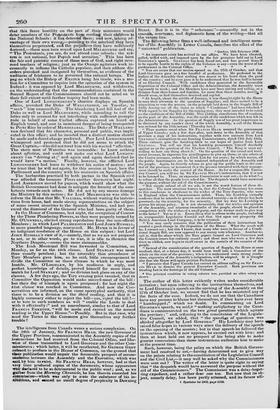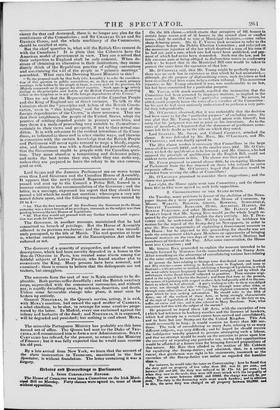Street. But it is in the " substance"—assuredly not in
the smoot,le, courteous, and diplomatic form of the writing—that all the venom lies.
The following letter fkom a well-informed and intelligent mem- ber ofthe Assembly in Lower Canada, describes the effect of the " untoward" publication. .,Quebec, 15th February 1838. '4 An important crisis has arrived in our affairs. We have been cheated, gulled, trifled with, and imposed upon by the fair promises held out in Lord GosFoRD's speech. GLENELG has been found out, and has proved himself to be equally hostile to the rights of the Colonies as any—even the worst of his
predecessors in the Colonial Office. • • •
" You are aware that our session opened on the 27th of October, and that Lord GOSFORD gave us a fine handful of professions. He professed to the leaders of the Assembly that nothing was nearer to his heart than the good: of the country ; and he even gave it to be understood that he was half in favour of an Elective Council. With confidence thus generated in the favourable disposition of the Colonial Office and the Administration, the Assembly went vigorously to work ; and the Members have now been slaving and toiling, at a distance from their homes and families, for more than three months, mere it
it should seem, to find themselves deceived and cajoled.
" At length, about the middle of January, it was thought right by the House to turn their attention to the question of Supplies; and theme seemed to be a disposition to vote the arrears, on the principle laid down in the Supply Bill of 1833, leaving out all the items to which " Conditions" had been attached.'
With regard to the Supplies for the coming year, they were intended to be voted on the conditions of the Bill of 1833. This yielding, conciliatory line of conduct, on the part cif the Assembly, was the result of the confidence which was felt in the Administration. As the question of Supply was of too great importance to be discussed by any number short of the whole Assembly, a call of the House was ordered for the 11 th instant (Thursday last.)
" Thus matters stood when Sir FRANCIS HEAD assumed the government of Upper Canada ; and, a few days after, sent down to the Assembly of that province a copy of his instructions, together with two extracts from Lord GLENELG'S instructions to our humbug Commissioners, dated 17th July 1835. These extracts give the finishing-blow to our hopes of justice firm Lard GLENELG. You will see that his Lordship pronounces himself decidedly against us on the question of the Elective Council. ` The King is most un- willing to hear any thing about it.' On the question of the casual and terri- torial revenue, he expresses his unwillingness to give up those, or any others of the Crown revenues, unless by a Civil List for ten years; by which means, all the public functionaries are to be rendered independent of the Assembly and the people. Again, he directly refuses to give up the public lands to the con- trol of the province, or to consent thit the persons iutrusted with their manage- ment should be under the control of the House. As for a responsible Execu- tive Council, you will see by Sir FRANCIS HEAD'S instructions, that it is not to be listened to. Thus, an expensive Commission is sent out—to do what ?- to refuse all that the people have asked for. The despatch would have answered the purpose, without the aid of the Commissioners.
"But simple refusal of all we ask, is not the worst feature of these de- spatches. The most atrocious feature is, that the Colonial Secretary has come to this conclusion in obedience to the wishes of the Tory deputies, who were in England when the Commissioners sailed. Thus, his Lordship virtually confesses that he intends to govern our devoted country—as it always has been governed—by the minority, for the minority. But we dare his Lordship to pursue his insane policy. Is it not abominable, that the wishes and opinions of the Assembly, and nineteen• twentieths of the people, should be placed in competition with the wishes of a small party, and the former made to give way including an the latter? Yet so it is, Every thing that is odious to the people, an irresponsible Legislative Council and that blot upon our prosperity the- British American Land Company, is to be retained. You may easily conceive that the publication of these instructions has
created a great change in the disposition of the House. What the result will be, I cannot say ; but this I know, that many who were in favour of a Condi- tional Supply Bill, are now opposed to any money vote whatever. Another re- sult is, that the abuse which the Tory papers heaped on Lord GOSIORD and the Commis.ioners has suddenly ceased ; and those men who were a few days since so vilified, now begin to smell sweet in the nostrils of the enemies of the people.
"Instead of the consideration of the question of Supply, the House at once resolved, that, at a future day, it would form itself into a Committee of the whole on the state of the province; when it is understood some strong resolu- tions, expressive of the Assembly's indignation, will be adopted. It is thought also that the House will again petition Parliament. • S • " I perceive that Upper Canada has carried an address calling on Sir FRAN- CIS HEAD to dismiss the present Executive Council. Both provinces are treading fast in the footsteps of the old Colonies."
• The principal condition in voting salaries was, provided no other salary was drawn.
The author of this letter evidently writes under considerable
irritation ; but upon referring to the instructions themselves, and to Lord GOsFoRD'S speech on the opening of the Assembly on the 27th of October last, we cannot find that he has misstated any of the facts of the case. Indeed, we do not see that the Canadians have any persons to blame but themselves, if they have ever been " humbugged ;" which we doubt. In commenting on Lord GOsFORD'S speech, we said,t "nothing satisfactory to the Cana- dians is communicated on the two great questions which agitate
the province ; " and, referring to the constitution of the Legisla-
tive Council, we added, that " the quest of questions was shirked altogether by Lord GosFonn."- His Lordship may have "gyp raised false hopes in various ways since the delivery of the speech on the opening of the session ; but in that speech he followed the- instructions which, it now appears, he carried out with hitn; and then at least held out no prospect of his being able to make greater concessions than those instructions authorize him to make at the present time. Such, however, being the policy on which the British Govern- ment had resolved to act,—having determined not to give way on the points relating to the constitution of the Legislative Council and the Civil List,—it may well be asked why the Commissioners were sent out ? The writer of the letter is quite right in saying that "the despatch would have answered the purpose without the aid of the Commissioners." The Commission was a delay-beget- ting expedient, and a rather dear one too. But now that its ob- ject, namely delay, has been partly attained, and its future etli- t Spectator for 1835, pao 1152.
eieney for that end destroyed, there is no longer any plea for the continUance of the Commission ; and Sir CHARLES GUM,' and Sir GEounz GIPos, and the whole machinery of the Commission, should be recalled at once.
But the chief question is, what will the British Gov( rnment do with the Canadiaus ? It is plain that the Colonists have the American model of government in view. They are rt solved that their subjection to Englund shall be only nominal. When de- sirous of obtaining an alteration in their institutions, they imme- diately think of the Republican practice of calling conventions and ascertaining the oill of the people in " primary meetings" assembled. What says the Downing Street Minister to this ?
"To the proposal made by that body (the Assembly) to refer the considera- tion of this question to public conventions, or, as they are tel meth primary - meetings, to be holden by the people at large, in every part of the province, /its Majesty commands me to oppose his direct net/Wire. Such appe..ls thge utterly firei.on to the principles and habits of the British Constituticn, as existing either in this kingdom or in any of the foreign dependencies of the Crown."
Thus we see that the Representatives of the Canadian People and the King of England are at direct variance. To talk to the Colonists about the "principles and habits of the British Consti- tution," even in " this kingdom," and far more "in any of the foreign dependencies of the Crown," is sheer nonsense. They see that their neighbours, the people of the United States, adopt the practice of settling disputed points in primary assemblies, and they deem it a mode of proceeding very suitable to themselves— certainly to their views and prospects, if not to their actual con- dition. It is with reference to the evident intentions of the Cana- dians, as indicated in these and in oilier similar ways, and likewise in connexion with the certain. knowledge that the British People and Parliament will never agam consent to wage a bloody, expen- sive, and disastrous war with a disaffected and powerful colony, that the Government ought to grapple with the Canadian ques- tion. They must abandon a temporizing and dishonest policy, and make the best terms they can, while they can make any, unless they are prepared to leave the colony to its own courses, good or evil.



























 Previous page
Previous page